- Home
- H. P. Lovecraft
The Shunned House Page 3
The Shunned House Read online
Page 3
not a thing of unmitigated happiness. Thehouse, it is true, was still in good condition; and the street had beenwidened and changed in name from Back Street to Benefit Street. ButMercy Dexter's once robust frame had undergone a sad and curious decay,so that she was now a stooped and pathetic figure with hollow voice anddisconcerting pallor--qualities shared to a singular degree by the oneremaining servant Maria. In the autumn of 1782 Phebe Harris gave birthto a still-born daughter, and on the fifteenth of the next May MercyDexter took leave of a useful, austere, and virtuous life.
William Harris, at last thoroughly convinced of the radicallyunhealthful nature of his abode, now took steps toward quitting it andclosing it for ever. Securing temporary quarters for himself and hiswife at the newly opened Golden Ball Inn, he arranged for the buildingof a new and finer house in Westminster Street, in the growing part ofthe town across the Great Bridge. There, in 1785, his son Dutee wasborn; and there the family dwelt till the encroachments of commercedrove them back across the river and over the hill to Angell Street, inthe newer East Side residence district, where the late Archer Harrisbuilt his sumptuous but hideous French-roofed mansion in 1876. Williamand Phebe both succumbed to the yellow fever epidemic of 1797, but Duteewas brought up by his cousin Rathbone Harris, Peleg's son.
Rathbone was a practical man, and rented the Benefit Street housedespite William's wish to keep it vacant. He considered it an obligationto his ward to make the most of all the boy's property, nor did heconcern himself with the deaths and illnesses which caused so manychanges of tenants, or the steadily growing aversion with which thehouse was generally regarded. It is likely that he felt only vexationwhen, in 1804, the town council ordered him to fumigate the place withsulfur, tar, and gum camphor on account of the much-discussed deaths offour persons, presumably caused by the then diminishing fever epidemic.They said the place had a febrile smell.
Dutee himself thought little of the house, for he grew up to be aprivateersman, and served with distinction on the _Vigilant_ underCaptain Cahoone in the War of 1812. He returned unharmed, married in1814, and became a father on that memorable night of September 23, 1815,when a great gale drove the waters of the bay over half the town, andfloated a tall sloop well up Westminster Street so that its masts almosttapped the Harris windows in symbolic affirmation that the new boy,Welcome, was a seaman's son.
Welcome did not survive his father, but lived to perish gloriously atFredericksburg in 1862. Neither he nor his son Archer knew of theshunned house as other than a nuisance almost impossible torent--perhaps on account of the mustiness and sickly odor of unkempt oldage. Indeed, it never was rented after a series of deaths culminating in1861, which the excitement of the war tended to throw into obscurity.Carrington Harris, last of the male line, knew it only as a deserted andsomewhat picturesque center of legend until I told him my experience. Hehad meant to tear it down and build an apartment house on the site, butafter my account decided to let it stand, install plumbing, and rent it.Nor has he yet had any difficulty in obtaining tenants. The horror hasgone.
3
It may well be imagined how powerfully I was affected by the annals ofthe Harrises. In this continuous record there seemed to me to brood apersistent evil beyond anything in nature as I had known it; an evilclearly connected with the house and not with the family. Thisimpression was confirmed by my uncle's less systematic array ofmiscellaneous data--legends transcribed from servant gossip, cuttingsfrom the papers, copies of death certificates by fellow-physicians, andthe like. All of this material I cannot hope to give, for my uncle was atireless antiquarian and very deeply interested in the shunned house;but I may refer to several dominant points which earn notice by theirrecurrence through many reports from diverse sources. For example, theservant gossip was practically unanimous in attributing to the fungousand malodorous _cellar_ of the house a vast supremacy in evil influence.There had been servants--Ann White especially--who would not use thecellar kitchen, and at least three well-defined legends bore upon thequeer quasi-human or diabolic outlines assumed by tree-roots and patchesof mold in that region. These latter narratives interested meprofoundly, on account of what I had seen in my boyhood, but I felt thatmost of the significance had in each case been largely obscured byadditions from the common stock of local ghost lore.
Ann White, with her Exeter superstition, had promulgated the mostextravagant and at the same time most consistent tale; alleging thatthere must lie buried beneath the house one of those vampires--the deadwho retain their bodily form and live on the blood or breath of theliving--whose hideous legions send their preying shapes or spiritsabroad by night. To destroy a vampire one must, the grandmothers say,exhume it and burn its heart, or at least drive a stake through thatorgan; and Ann's dogged insistence on a search under the cellar had beenprominent in bringing about her discharge.
Her tales, however, commanded a wide audience, and were the more readilyaccepted because the house indeed stood on land once used for burialpurposes. To me their interest depended less on this circumstance thanon the peculiarly appropriate way in which they dovetailed with certainother things--the complaint of the departing servant Preserved Smith,who had preceded Ann and never heard of her, that something "sucked hisbreath" at night; the death-certificates of the fever victims of 1804,issued by Doctor Chad Hopkins, and showing the four deceased persons allunaccountably lacking in blood; and the obscure passages of poor RhobyHarris's ravings, where she complained of the sharp teeth of aglassy-eyed, half-visible presence.
Free from unwarranted superstition though I am, these things produced inme an odd sensation, which was intensified by a pair of widely separatednewspaper cuttings relating to deaths in the shunned house--one from the_Providence Gazette and Country-Journal_ of April 12, 1815, and theother from the _Daily Transcript and Chronicle_ of October 27,1845--each of which detailed an appallingly grisly circumstance whoseduplication was remarkable. It seems that in both instances the dyingperson, in 1815 a gentle old lady named Stafford and in 1845 aschoolteacher of middle age named Eleazar Durfee, became transfigured ina horrible way, glaring glassily and attempting to bite the throat ofthe attending physician. Even more puzzling, though, was the final casewhich put an end to the renting of the house--a series of anemia deathspreceded by progressive madnesses wherein the patient would craftilyattempt the lives of his relatives by incisions in the neck or wrist.
This was in 1860 and 1861, when my uncle had just begun his medicalpractise; and before leaving for the front he heard much of it from hiselder professional colleagues. The really inexplicable thing was the wayin which the victims--ignorant people, for the ill-smelling and widelyshunned house could now be rented to no others--would babblemaledictions in French, a language they could not possibly have studiedto any extent. It made one think of poor Rhoby Harris nearly a centurybefore, and so moved my uncle that he commenced collecting historicaldata on the house after listening, some time subsequent to his returnfrom the war, to the first-hand account of Doctors Chase and Whitmarsh.Indeed, I could see that my uncle had thought deeply on the subject, andthat he was glad of my own interest--an open-minded and sympatheticinterest which enabled him to discuss with me matters at which otherswould merely have laughed. His fancy had not gone so far as mine, but hefelt that the place was rare in its imaginative potentialities, andworthy of note as an inspiration in the field of the grotesque andmacabre.
For my part, I was disposed to take the whole subject with profoundseriousness, and began at once not only to review the evidence, but toaccumulate as much more as I could. I talked with the elderly ArcherHarris, then owner of the house, many times before his death in 1916;and obtained from him and his still surviving maiden sister Alice anauthentic corroboration of all the family data my uncle had collected.When, however, I asked them what connection with France or its languagethe house could have, they confessed themselves as frankly baffled andignorant as I. Archer knew nothing, and all that Miss Harris could saywas that an old allusion her grandfather, Dutee Harris, had heard ofmight hav
e shed a little light. The old seaman, who had survived his sonWelcome's death in battle by two years, had not himself known thelegend, but recalled that his earliest nurse, the ancient Maria Robbins,seemed darkly aware of something that might have lent a weirdsignificance to the French raving of Rhoby Harris, which she had sooften heard during the last days of that hapless woman. Maria had beenat the shunned house from 1769 till the removal of the family in 1783,and had seen Mercy Dexter die. Once she hinted to the child Dutee of asomewhat peculiar circumstance in Mercy's last moments, but he had soonforgotten all about it save that it was something peculiar. Thegranddaughter, moreover, recalled even this much with difficulty. Sheand her brother were not so much interested in the house as was Archer'sson Carrington, the present owner, with whom I talked after myexperience.
* * * * *
Having exhausted the Harris family of all the

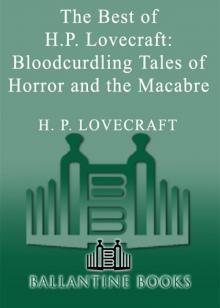 The Best of H.P. Lovecraft
The Best of H.P. Lovecraft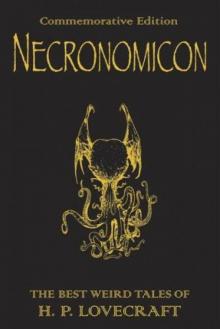 The Definitive H.P. Lovecraft: 67 Tales Of Horror In One Volume
The Definitive H.P. Lovecraft: 67 Tales Of Horror In One Volume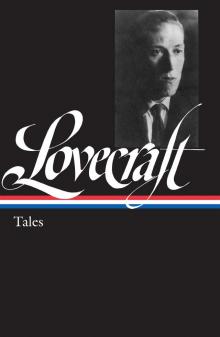 The Complete Works of H.P. Lovecraft
The Complete Works of H.P. Lovecraft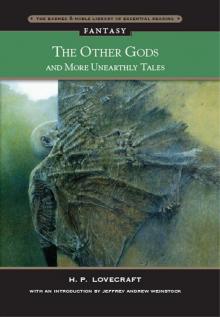 Other Gods and More Unearthly Tales
Other Gods and More Unearthly Tales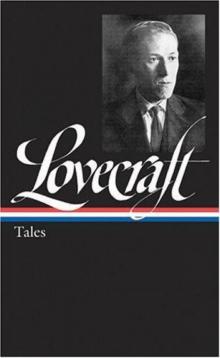 Lovecraft's Fiction Volume I, 1905-1925
Lovecraft's Fiction Volume I, 1905-1925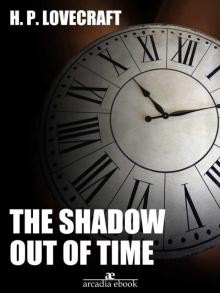 The Shadow Out of Time
The Shadow Out of Time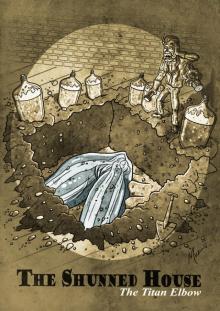 The Shunned House
The Shunned House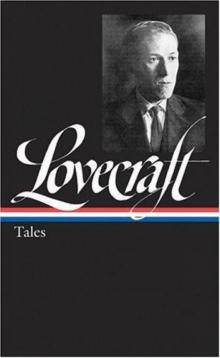 Lovecraft's Fiction Volume II, 1926-1928
Lovecraft's Fiction Volume II, 1926-1928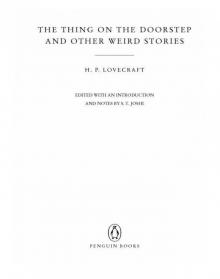 The Thing on the Doorstep and Other Weird Stories
The Thing on the Doorstep and Other Weird Stories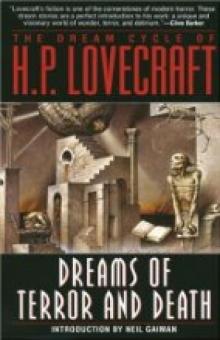 Dream Cycle of H. P. Lovecraft: Dreams of Terror and Death
Dream Cycle of H. P. Lovecraft: Dreams of Terror and Death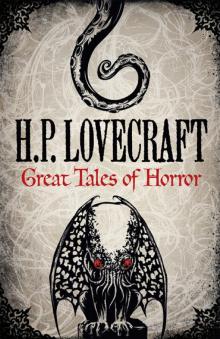 Great Tales of Horror
Great Tales of Horror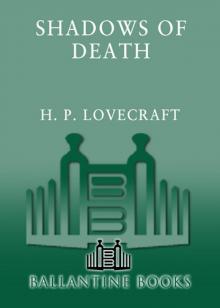 Shadows of Death
Shadows of Death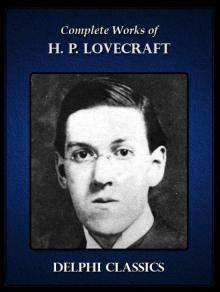 Delphi Complete Works of H. P. Lovecraft (Illustrated)
Delphi Complete Works of H. P. Lovecraft (Illustrated)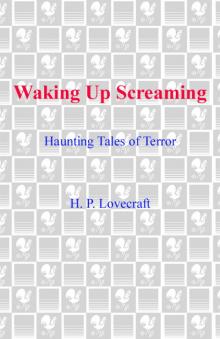 Waking Up Screaming: Haunting Tales of Terror
Waking Up Screaming: Haunting Tales of Terror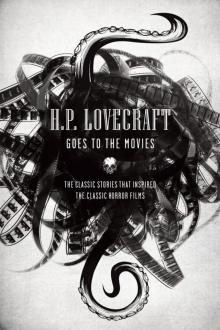 H.P. Lovecraft Goes to the Movies
H.P. Lovecraft Goes to the Movies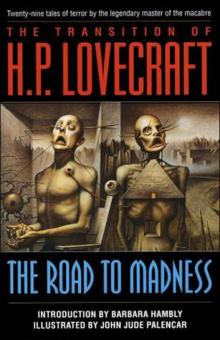 The Road to Madness
The Road to Madness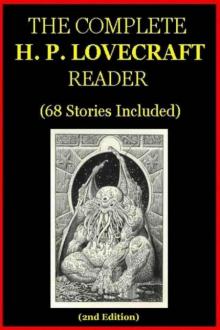 The Complete H.P. Lovecraft Reader (68 Stories)
The Complete H.P. Lovecraft Reader (68 Stories)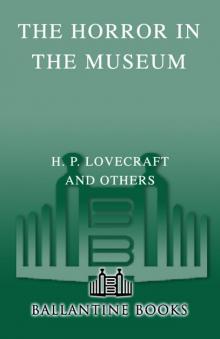 The Horror in the Museum
The Horror in the Museum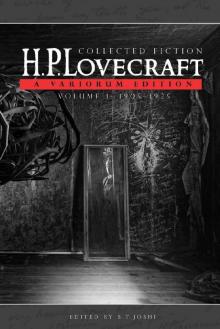 Collected Fiction Volume 1 (1905-1925): A Variorum Edition
Collected Fiction Volume 1 (1905-1925): A Variorum Edition Lovecrafts_Fiction, vol.I_1905-1925
Lovecrafts_Fiction, vol.I_1905-1925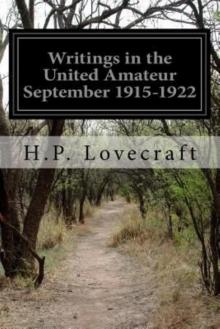 Writings in the United Amateur, 1915-1922
Writings in the United Amateur, 1915-1922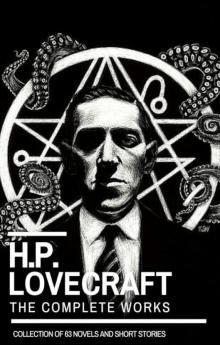 H.P. Lovecraft: The Complete Works
H.P. Lovecraft: The Complete Works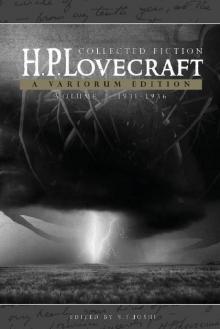 Collected Fiction Volume 3 (1931-1936): A Variorum Edition
Collected Fiction Volume 3 (1931-1936): A Variorum Edition H.P. Lovecraft: The Complete Fiction
H.P. Lovecraft: The Complete Fiction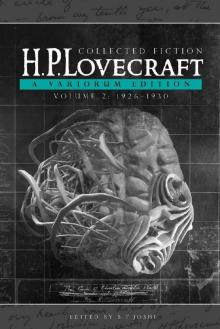 Collected Fiction Volume 2 (1926-1930): A Variorum Edition
Collected Fiction Volume 2 (1926-1930): A Variorum Edition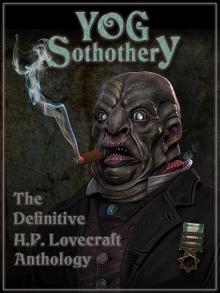 Yog Sothothery - The Definitive H.P. Lovecraft Anthology
Yog Sothothery - The Definitive H.P. Lovecraft Anthology The Complete H.P. Lovecraft Collection (Xist Classics)
The Complete H.P. Lovecraft Collection (Xist Classics)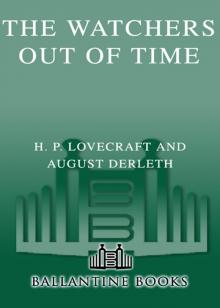 The Watchers Out of Time
The Watchers Out of Time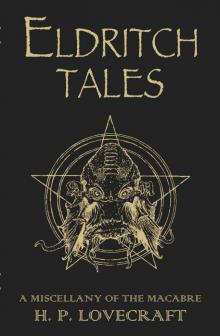 Eldritch Tales
Eldritch Tales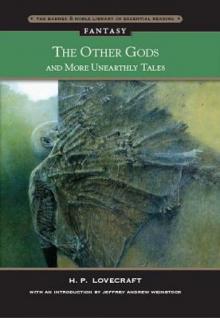 The Other Gods And More Unearthly Tales
The Other Gods And More Unearthly Tales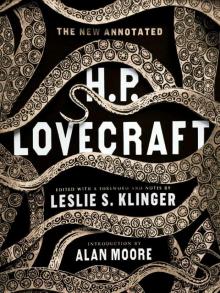 The New Annotated H. P. Lovecraft
The New Annotated H. P. Lovecraft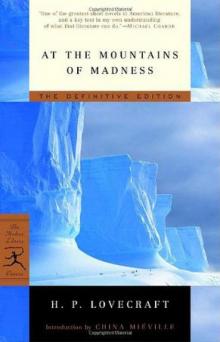 At the mountains of madness
At the mountains of madness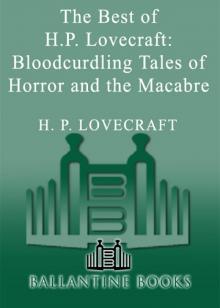 Bloodcurdling Tales of Horror and the Macabre
Bloodcurdling Tales of Horror and the Macabre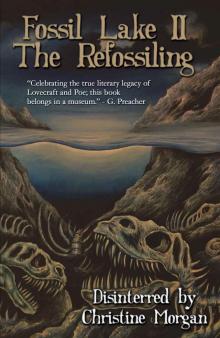 Fossil Lake II: The Refossiling
Fossil Lake II: The Refossiling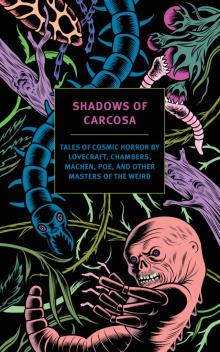 Shadows of Carcosa: Tales of Cosmic Horror by Lovecraft, Chambers, Machen, Poe, and Other Masters of the Weird
Shadows of Carcosa: Tales of Cosmic Horror by Lovecraft, Chambers, Machen, Poe, and Other Masters of the Weird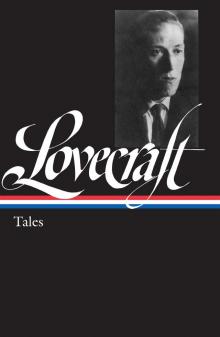 H. P. Lovecraft
H. P. Lovecraft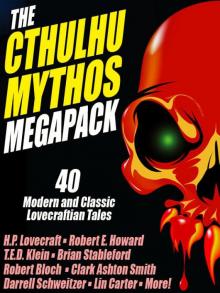 The Cthulhu Mythos Megapack
The Cthulhu Mythos Megapack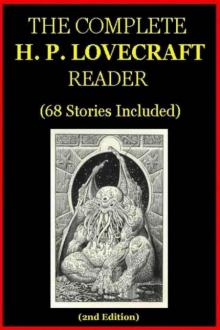 The Complete H. P. Lovecraft Reader (2nd Edition)
The Complete H. P. Lovecraft Reader (2nd Edition) The Complete Fiction
The Complete Fiction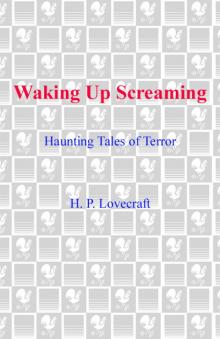 Waking Up Screaming
Waking Up Screaming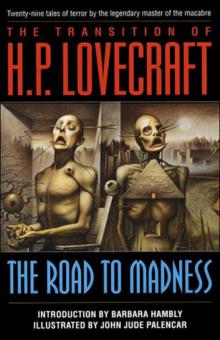 Transition of H. P. Lovecraft
Transition of H. P. Lovecraft![[1935] The Shadow Out of Time Read online](http://i1.bookreadfree.com/i2/04/12/1935_the_shadow_out_of_time_preview.jpg) [1935] The Shadow Out of Time
[1935] The Shadow Out of Time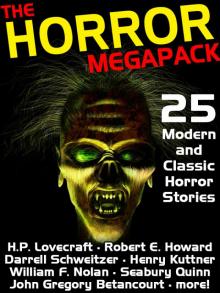 The Horror Megapack
The Horror Megapack